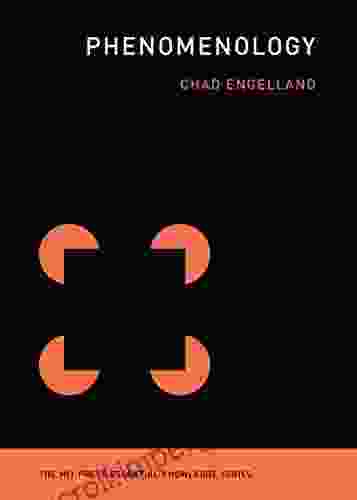Phenomenology: Unraveling the Mysteries of Subjective Experience

Phenomenology, a philosophical movement that emerged in the early 20th century, offers a unique and profound approach to understanding the world. It focuses on the study of conscious experience, seeking to uncover the essential structures and meanings that shape our perception of reality. This article will delve into the captivating realm of phenomenology, exploring its key concepts, historical development, and contemporary significance.
Origins and Key Concepts
The term "phenomenology" was first coined by German philosopher Edmund Husserl, who is widely regarded as the father of the movement. Husserl sought to develop a rigorous and scientific method for studying consciousness, arguing that the traditional approach of objectivism had failed to capture the richness and complexity of subjective experience.
4.5 out of 5
| Language | : | English |
| File size | : | 573 KB |
| Text-to-Speech | : | Enabled |
| Screen Reader | : | Supported |
| Enhanced typesetting | : | Enabled |
| Word Wise | : | Enabled |
| Print length | : | 253 pages |
At the core of phenomenology lies the concept of the "lived world." This refers to the world as it is directly experienced by us, prior to any intellectualization or abstraction. Phenomenologists believe that the lived world is the primary reality, and that all other forms of knowledge and understanding must be grounded in it.
Another key concept is that of "intentionality." Phenomenologists argue that consciousness is always directed toward something, whether it be an object, a person, or an idea. This means that consciousness is not a passive recipient of sensory data, but rather an active and engaged participant in the world.
Historical Development
After Husserl's initial work, phenomenology was further developed by a number of philosophers, including Martin Heidegger, Maurice Merleau-Ponty, and Emmanuel Levinas. Heidegger explored the existential dimension of phenomenology, focusing on the question of human being and our relationship to the world. Merleau-Ponty investigated the role of the body in our perception and understanding of the world, while Levinas developed a phenomenology of ethics that focused on the encounter with the other.
Contemporary Phenomenology
In recent decades, phenomenology has experienced a resurgence of interest in various fields, including philosophy, psychology, sociology, and anthropology. Contemporary phenomenologists are exploring a wide range of topics, such as the phenomenology of emotions, the phenomenology of intersubjectivity, and the phenomenology of technology.
Phenomenology in Action: Applications
The insights of phenomenology have found practical applications in a variety of fields, including:
* Therapy and counseling: Phenomenology can help therapists to better understand the subjective experiences of their clients, leading to more effective and personalized treatments. * Education: Phenomenology can help educators to create more engaging and meaningful learning experiences that connect with students' lived worlds. * Design: Phenomenology can inform the design of products, spaces, and experiences that are attuned to the needs and perspectives of users. * Research: Phenomenology can provide a rigorous and nuanced approach to qualitative research, enabling researchers to uncover the rich and often hidden dimensions of human experience.
Phenomenology offers a fascinating and profound approach to understanding the world. By focusing on the study of conscious experience, it helps us to uncover the essential structures and meanings that shape our perception of reality. With its insights into the human condition and its practical applications in various fields, phenomenology continues to be a vibrant and relevant philosophical movement today.
For further exploration of phenomenology, consider reading the following resources:
* Phenomenology: The Basics by Robert Sokolowski * The Phenomenology of Husserl by Derek Wrathall * Being and Time by Martin Heidegger
May this article serve as a gateway to the captivating world of phenomenology, inspiring you to delve deeper into its rich and multifaceted tapestry.

4.5 out of 5
| Language | : | English |
| File size | : | 573 KB |
| Text-to-Speech | : | Enabled |
| Screen Reader | : | Supported |
| Enhanced typesetting | : | Enabled |
| Word Wise | : | Enabled |
| Print length | : | 253 pages |
Do you want to contribute by writing guest posts on this blog?
Please contact us and send us a resume of previous articles that you have written.
 Book
Book Novel
Novel Page
Page Chapter
Chapter Text
Text Story
Story Genre
Genre Reader
Reader Library
Library Paperback
Paperback E-book
E-book Magazine
Magazine Newspaper
Newspaper Paragraph
Paragraph Sentence
Sentence Bookmark
Bookmark Shelf
Shelf Glossary
Glossary Bibliography
Bibliography Foreword
Foreword Preface
Preface Synopsis
Synopsis Annotation
Annotation Footnote
Footnote Manuscript
Manuscript Scroll
Scroll Codex
Codex Tome
Tome Bestseller
Bestseller Classics
Classics Library card
Library card Narrative
Narrative Biography
Biography Autobiography
Autobiography Memoir
Memoir Reference
Reference Encyclopedia
Encyclopedia E Benjamin Skinner
E Benjamin Skinner Catherine Shanahan
Catherine Shanahan Matt Whyman
Matt Whyman Joel Best
Joel Best Cerebrum Publishing
Cerebrum Publishing Rohan O Grady
Rohan O Grady Candice Kumai
Candice Kumai Shawn Adler
Shawn Adler Dr Claudia Rachel Johnsen
Dr Claudia Rachel Johnsen Lauren Peterson
Lauren Peterson Jean Louis Cohen
Jean Louis Cohen Rupert Colley
Rupert Colley Jennifer Louden
Jennifer Louden Sivkishen Ji
Sivkishen Ji Joe Slack
Joe Slack Cask J Thomson
Cask J Thomson Ken Connor
Ken Connor Catherine Watson
Catherine Watson Nazir Afzal
Nazir Afzal Cesar A Sciammarella
Cesar A Sciammarella
Light bulbAdvertise smarter! Our strategic ad space ensures maximum exposure. Reserve your spot today!
 Dave SimmonsFollow ·2.7k
Dave SimmonsFollow ·2.7k Jesse BellFollow ·15.3k
Jesse BellFollow ·15.3k W.H. AudenFollow ·2.6k
W.H. AudenFollow ·2.6k John KeatsFollow ·7.4k
John KeatsFollow ·7.4k Raymond ParkerFollow ·15.6k
Raymond ParkerFollow ·15.6k Walt WhitmanFollow ·19.5k
Walt WhitmanFollow ·19.5k Warren BellFollow ·4.6k
Warren BellFollow ·4.6k Foster HayesFollow ·16.8k
Foster HayesFollow ·16.8k

 Henry Hayes
Henry HayesVery Short Introductions: A Gateway to Knowledge...
In the realm of academia, where vast oceans of...

 Jean Blair
Jean BlairBorn on the Third of July: An Unforgettable Journey of...
Born on the Third...

 Benjamin Stone
Benjamin StoneEnvironmental Offsets: Striking a Balance between...
In the face of pressing environmental...

 Colin Foster
Colin FosterGirl With Power: My Boyhood Bully Diary
In this gripping and...

 Colin Foster
Colin FosterUnveiling the Unseen: The Collected Works of Charles Fort
Prepare to venture into...

 Gabriel Mistral
Gabriel MistralUnveiling the Hidden World of the English Republican...
Dive into the captivating world of 'The...
4.5 out of 5
| Language | : | English |
| File size | : | 573 KB |
| Text-to-Speech | : | Enabled |
| Screen Reader | : | Supported |
| Enhanced typesetting | : | Enabled |
| Word Wise | : | Enabled |
| Print length | : | 253 pages |












